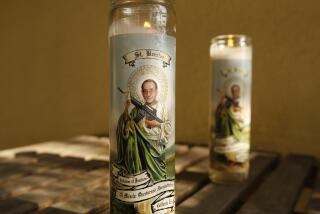Judge Issues Rebuttal to Lawyers in Toxics Case
- Share via
A judge whose jury instructions drew fire from defense lawyers after an unprecedented $760-million punitive damage award against five major oil and chemical companies says he was “not prejudiced or biased.”
Los Angeles Superior Court Judge Richard C. Hubbell--who last month urged the jury to “send a notice out to the world” against the evils of toxic pollution--said in a written statement that he was seeking to correct misleading comments by lawyers for the companies.
Hubbell’s words, made in response to a motion seeking his disqualification in related cases, amounted to a blunt rebuttal of defense allegations that he has consistently sided with the plaintiffs and their lead attorney, Thomas V. Girardi, in presiding over several trials involving pollution at Lockheed’s Burbank facilities.
Nevertheless, Hubbell agreed to recuse himself in all future cases involving claims of toxic pollution by 624 former Lockheed workers, about 500 of whom have yet to have their cases heard.
The judge declined to disqualify himself from the present case, in which jurors last month ordered the five companies to pay $760 million in punitive damages to 38 past and present Lockheed workers who suffered a wide variety of side effects from chemicals. The verdict is now being appealed. Some legal experts have said they expect the award to be substantially reduced on appeal.
In recusing himself from future cases involving the Lockheed workers, Hubbell declared from the bench in a brief Tuesday session, “I have concluded that perhaps a different approach might be more effective.
“I have encouraged and ordered these remaining parties at the end of each trial to seek mediation and to [enter] voluntary and mandatory settlement conferences before some highly outstanding judges throughout the state both in Los Angeles and San Francisco, but to no avail.”
Last month’s verdict, the largest punitive damage judgment ever rendered in any court in a toxic pollution case, went against Exxon, Unocal, Shell, Ashland and DuPont. Previously, the jury awarded the workers $25.4 million in compensatory damages.
The companies produced the chemicals used by the workers in building the Stealth fighter at Lockheed’s Burbank plant. While it was under Lockheed supervision that the workers used the chemicals, Lockheed settled its share of liability for the pollution for much less--$33 million--in 1992.
Defense attorneys have been caustic toward Hubbell. They had sought to disqualify him earlier for allegedly siding with Girardi too often in the proceedings.
In his answer to this second disqualification motion, which he insisted duplicated the first, Hubbell wrote, “All statements made by me and all actions taken by me in this proceeding have been done in furtherance of what I believe were my judicial duties. . . .
“The purpose of my remarks during this latest trial and particularly in the (punitive) damage phase was to assist the jury in arriving at a verdict, if they could, and for no other reason.”
Hubbell added, “Because of the numerous corrections to the record I was required to make because of the defendants’ argument, I considered a mistrial caused by such argument but elected to avoid such a drastic decision by speaking directly to the jury.
“I had earlier informed the parties that I did not wish to make such comments. . . . These comments were made to assist the jury.”
Among the remarks that Hubbell made that had been criticized by the defense were these:
“These people (the defendant companies) sell chemicals every place, you see. Do we want to send out a message that this conduct will not be countenanced in the least in Los Angeles County?
“How much money is it going to take to send home a message to five of the biggest corporations in the world that this isn’t going to be done anymore?
“I think Mr. Girardi put his finger on it. So pick a figure and say, let’s send a notice out to the world, this is the price in Los Angeles County.”
More to Read
Sign up for Essential California
The most important California stories and recommendations in your inbox every morning.
You may occasionally receive promotional content from the Los Angeles Times.










